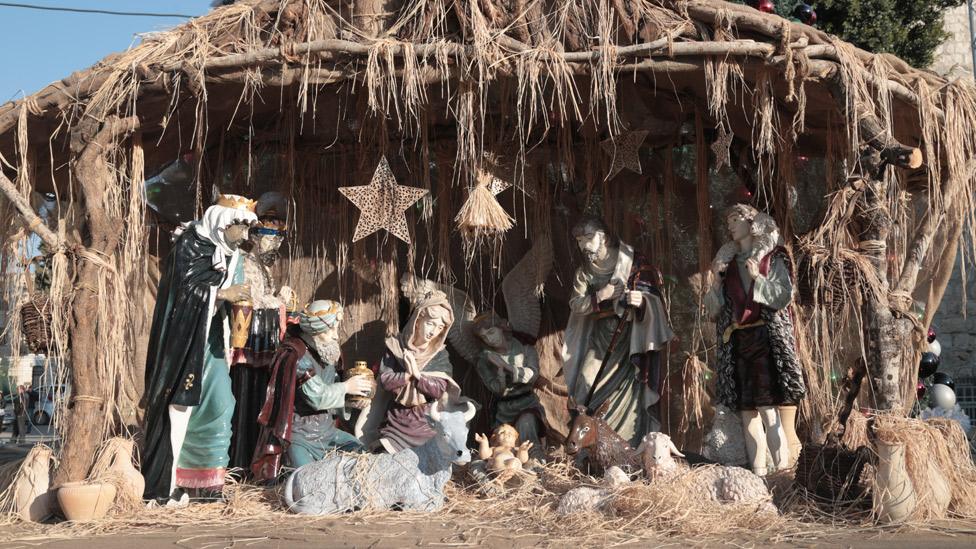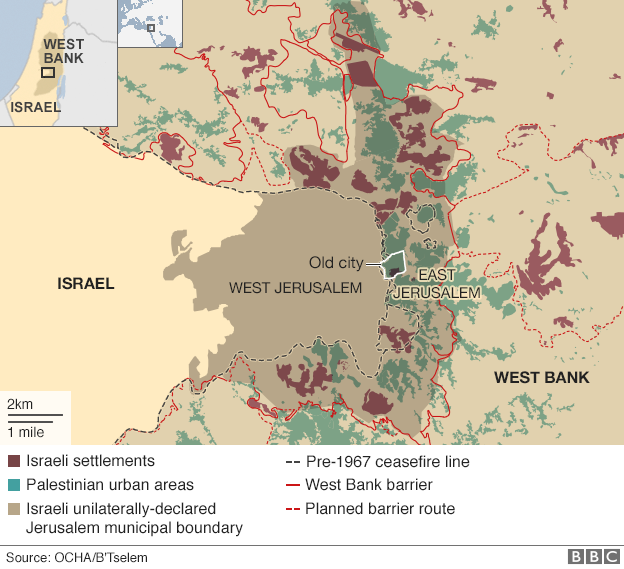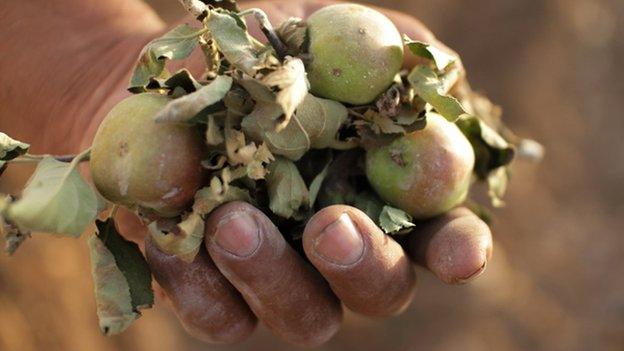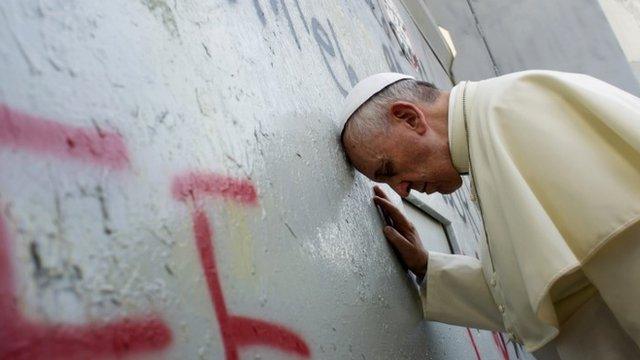Christmas in Bethlehem: Hopes and fears for the future
- Published


As Bethlehem prepares for Christmas, five people chosen to represent characters in the original Nativity story have been speaking about their hopes and fears for the festive period.
Celebrations are taking place in the West Bank town where it is believed that Jesus was born. However this year they are overshadowed by the latest Israeli-Palestinian violence that shows no signs of abating.
The mother: Mary Anastas
Mother of three Mary Anastas runs a tourist souvenir shop in Bethlehem
Mary Anastas runs a shop selling her husband's stone sculptures and feels a special affinity with her namesake, the Virgin Mary, mother of Jesus.
She is a mother of three children herself and worries about their safety in these tense times. The two eldest are studying at Birzeit University, north of Ramallah, but come home at weekends.
Young Palestinians regularly join protests that result in confrontations with Israeli soldiers. There are flashpoints across the West Bank including on the edge of Ramallah and in Bethlehem.
Like many Palestinian Christians, Mary thinks the holiday spirit is dampened this year and that festivities will be relatively low-key.
The shepherd: Kamal Nabaheen
Shepherd Kamal Nabaheen keeps sheep and goats in the fields outside Bethlehem
Shepherds watching their flocks by night are believed by Christians to have been the first to hear about Jesus' birth. Tradition has it that they were told the news by an angel in the Shepherds' Field in Beit Sahur, next to Bethlehem.
Nowadays, Kamal Nabaheen keeps sheep and goats in this area. He is Muslim, but prizes his connection to the Biblical shepherds.
Recently shepherding has become much more difficult because of a lack of open land. Jewish settlements are expanding nearby. They are seen as illegal under international law, but Israel disagrees.
Israel has also built part of its separation barrier here. It says this is needed for security, but Palestinians see it as a land grab.
The innkeeper: Fadi Kattan
Fadi Kattan runs a boutique hotel in the Old City of Bethlehem
According to the Bible, there was no room at the inn in Bethlehem for Mary and Joseph. With no bed available, baby Jesus was laid in a manger.
In modern times, hotels are usually full on Christmas Eve. Arab-Israelis as well as foreign visitors come to join the festivities as processions of church leaders arrive from Jerusalem.
Fadi Kattan runs a new boutique guesthouse, Hosh al-Syrian, in the Old City of Bethlehem. He says that since the recent troubles, people have cancelled their hotel bookings for next year.
There are also other underlying challenges for local tourism. It tends to be seasonal with Christian pilgrims coming at Easter and Christmas, but more and more visitors are staying elsewhere and coming to Bethlehem as a day trip on a Holy Land tour. The main attraction is the Church of the Nativity, built on the spot where it is believed Jesus was born.
Recent violence
21 Israelis have been killed since mid-September, mostly in Palestinian stabbings and shooting attacks, in Israel and the West Bank
More than 130 Palestinians have been killed - Israeli officials say half of these were attackers, while others have been killed in clashes with Israeli forces in the West Bank or in cross-border violence in Gaza
In Bethlehem, there have been at least five deaths

The wise man: Father Jamal Khadr
Father Jamal takes part in a Christmas procession from Jerusalem to Bethlehem to hold a special mass.
The Nativity story tells how wise men, or magi, came to pay their homage to Jesus bringing him gifts of gold, frankincense and myrrh.
Each Christmas Eve, Latin Catholic priest, Father Jamal Khadr, accompanies the patriarch in a traditional procession from Jerusalem. On the way to the Church of the Nativity, they are met by Palestinian Christians for a special mass at midnight.
In 2003, an 8m(26ft)-high concrete wall was erected in Bethlehem - part of Israel's barrier built in and around the West Bank. A series of gates were constructed in the wall so that church leaders could continue to pass.
Nowadays clashes regularly take place by one of these gates. Typically, young Palestinians throw stones, marbles and petrol bombs at Israeli soldiers who respond with tear gas, rubber bullets, skunk water and live rounds.
Israel blames the violence on incitement by Palestinian leaders and social media. Father Jamal says that on the Palestinian side there are feelings of hopelessness and despair.
The carpenter: Jack Giacaman
Carpenter Jack Giacaman runs a workshop producing religious carvings
Like Joseph, the husband of Mary, Jack Giacaman works with wood. He carves large pieces himself and runs a workshop producing mainly religious items.
His main business involves traditional Nativity sets made out of olive wood grown in the holy land. For centuries, such religious items have been sold to visiting pilgrims.
About 40% of the Bethlehem economy relies directly on tourism. However since the town was separated from Jerusalem by Israel's barrier, most tourists now enter through an Israeli checkpoint.
Local souvenir sellers say that restricted access to the city has greatly affected their trade. They also complain about a system that sees large Palestinian stores pay a hefty commission to guides who bring in the tourists, which means many of the smaller shops lose out.
Interviews, videos and pictures: Yolande Knell, Jimmy Michael and Yousef Shomali
Video and web production: Alison Trowsdale and Sarah Fowler
- Published18 June 2014

- Published25 May 2014
